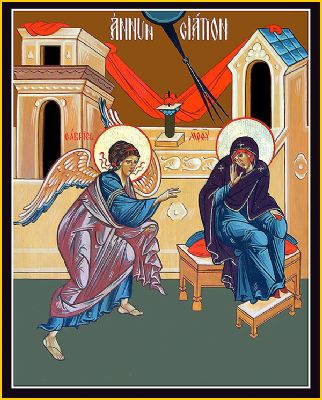|
|||
|---|---|---|---|
| This weekly bulletin insert complements the curriculum published by the Department of Christian Education of the Orthodox Church in America. This and many other Christian Education resources are available at http://dce.oca.org. | |||

The Feast of the Annunciation celebrates God proclamation to the world of His plans to come to the world as a baby in the womb of a mother, just as we all do. So the first chapter of Luke's Gospel tells of the archangel Gabriel presenting himself before a very young woman with words of great authority: "Hail, O favored one, the Lord is with you!" Mary is not so overcome by this amazing statement that she can't think. Though she is "greatly troubled" at what Gabriel says, she is able to "consider in her mind what sort of greeting this might be" (Luke 1: 29). When Gabriel describes in some detail what is to happen, and tells her that her little Jesus will be the Son of the Most High, she again shows presence of mind, and asks the very sensible question, "How can this be, since I have no husband?" (1:34). Once Gabriel makes God's plan clear, Mary accepts what he has told her. In this she's different from Zechariah, who has been told about the birth of his own son, John the Baptizer, a few verses earlier. Zechariah responds to Gabriel with skepticism, and pays the price by being made temporarily mute. Mary, by contrast, is so joyful that she goes to greet Zechariah's wife Elizabeth, who is also her cousin, with the good news. Luke has told us how Jesus Christ will become one of us, a Man born of a woman. Hebrews 2: 11-18 describes the way we can now be joined with Him, as a family in faith. This is possible because "he who sanctifies [Jesus Christ] and those who are sanctified [all of us] have one origin. That is why he is not ashamed to call them brethren" (2:11).
The verse goes on to say that Jesus will show His brotherhood with His people in the words of Psalm 22: "I will proclaim thy name to my brethren, in the midst of the congregation I will praise thee" (2:12). These words are triumphant verses from the same psalm that Jesus quoted on the cross, "My God, my God, why have you forsaken me?" The agonized words spoken on the cross give way to the thankful words quoted here, just as the cross gave way to the Resurrection. The next verses give insight into one of the greatest mysteries of our faith: the suffering of Our Lord. If He was to be our savior, "...he had to be made like his brethren in every respect" (2:17a). In other words, God humbled Himself to become one of us. Islam rejects this teaching, as do other faiths. But for us it is central, and the very last verse of the passage tells us why it's so important for humans who are so prone to mistakes and sins: "For because he himself has suffered and been tempted, he is able to help those who are tempted" (2:18). |
|||
